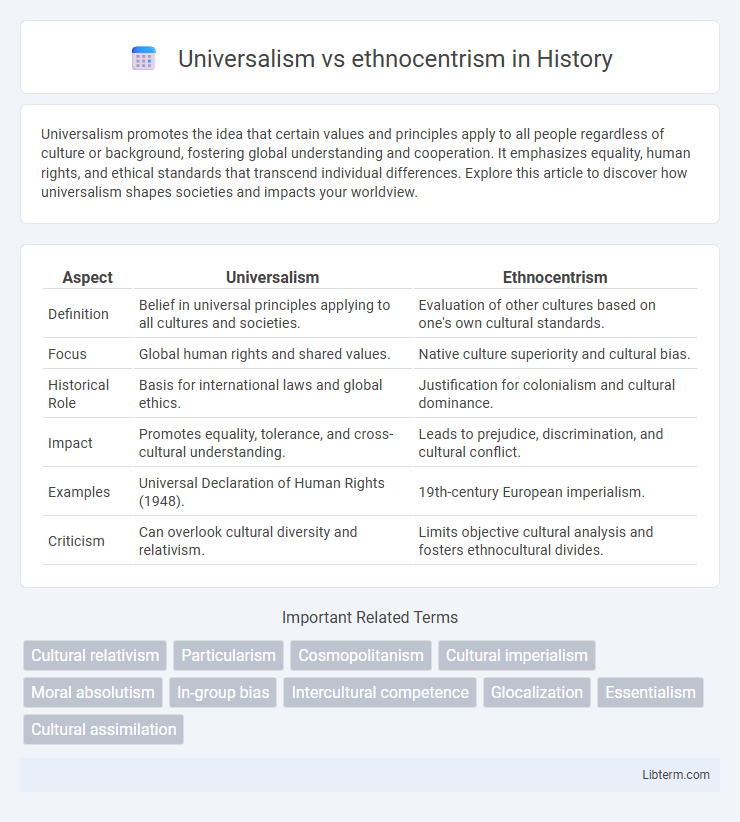Universalism promotes the idea that certain values and principles apply to all people regardless of culture or background, fostering global understanding and cooperation. It emphasizes equality, human rights, and ethical standards that transcend individual differences. Explore this article to discover how universalism shapes societies and impacts your worldview.
Table of Comparison
| Aspect | Universalism | Ethnocentrism |
|---|---|---|
| Definition | Belief in universal principles applying to all cultures and societies. | Evaluation of other cultures based on one's own cultural standards. |
| Focus | Global human rights and shared values. | Native culture superiority and cultural bias. |
| Historical Role | Basis for international laws and global ethics. | Justification for colonialism and cultural dominance. |
| Impact | Promotes equality, tolerance, and cross-cultural understanding. | Leads to prejudice, discrimination, and cultural conflict. |
| Examples | Universal Declaration of Human Rights (1948). | 19th-century European imperialism. |
| Criticism | Can overlook cultural diversity and relativism. | Limits objective cultural analysis and fosters ethnocultural divides. |
Understanding Universalism: Definition and Principles
Universalism refers to the ethical framework that emphasizes the application of consistent moral principles across all cultures, advocating that certain rights and values are inherently applicable to all humans regardless of cultural differences. It promotes the idea that human rights, justice, and equality are universal standards that transcend cultural boundaries and local customs. Understanding universalism involves recognizing its foundational principles, such as the inherent dignity of every individual and the belief that moral rules should be impartial and universally valid.
Defining Ethnocentrism: Meaning and Core Concepts
Ethnocentrism is the belief in the inherent superiority of one's own ethnic group or culture, often leading to prejudice and discrimination against others. It involves evaluating other cultures through the lens of one's own cultural norms and values, resulting in biased judgments. Core concepts include in-group favoritism, out-group hostility, and cultural relativism as its counterpoint, which promotes understanding diverse cultural perspectives.
Historical Background: Origins of Universalist and Ethnocentric Views
Universalism traces its origins to Enlightenment thinkers like Immanuel Kant, who emphasized universal moral principles applicable across all cultures. Ethnocentrism, deeply rooted in ancient civilizations, reflects a tendency to view one's own culture as superior, often justified through historical dominance and conquest narratives. These contrasting views evolved as societies encountered cultural diversity through exploration, colonization, and globalization, shaping ongoing debates about cultural relativism and human rights.
Key Differences Between Universalism and Ethnocentrism
Universalism asserts that certain ethical principles and values apply universally across all cultures, promoting consistency in moral judgments and behaviors worldwide. Ethnocentrism centers on evaluating other cultures based on the standards and customs of one's own culture, often leading to bias and misunderstanding. The core difference lies in universalism's emphasis on common human rights and global norms, whereas ethnocentrism prioritizes cultural relativism and in-group loyalty.
Universalism in Global Ethics and Human Rights
Universalism in global ethics asserts that human rights and moral principles apply universally, regardless of cultural or national differences, emphasizing common human dignity and equality. This perspective supports the enforcement of internationally recognized standards, such as the Universal Declaration of Human Rights, to protect individuals worldwide. Universalism challenges ethnocentrism by promoting the idea that ethical norms transcend local customs and cultural relativism.
Ethnocentrism’s Impact on Cultural Perception
Ethnocentrism shapes cultural perception by promoting the belief that one's own cultural norms and values are superior to others, which often leads to misunderstandings and prejudice. This biased viewpoint hinders cross-cultural communication and reinforces stereotypes, affecting social cohesion and international relations. Recognizing ethnocentrism is critical for fostering cultural sensitivity and promoting more inclusive global perspectives.
Universalism and Cultural Relativism: A Comparative Analysis
Universalism emphasizes the existence of universal ethical principles applicable to all cultures, advocating for consistent human rights and moral standards regardless of cultural context. Cultural relativism challenges this by asserting that moral values and practices are culturally specific, and ethical judgments should be made within the framework of each culture's unique norms. The comparative analysis reveals a tension between upholding universal norms to protect fundamental rights and respecting cultural diversity to avoid ethnocentric bias in moral evaluation.
Consequences of Ethnocentric Thinking in Society
Ethnocentric thinking fosters social division by promoting in-group favoritism and out-group discrimination, which undermines social cohesion and cooperation. It often leads to prejudice, stereotyping, and systemic inequalities, impairing multicultural integration and equitable policy-making. Persistent ethnocentrism can escalate conflicts and hinder globalization by reinforcing narrow cultural perspectives over universal human rights and values.
Universalism vs Ethnocentrism in International Relations
Universalism in international relations promotes the application of common principles and norms across all cultures, emphasizing human rights and global governance frameworks. Ethnocentrism prioritizes the values and interests of one's own culture or nation, often leading to biased policies and conflict with diverse international actors. Understanding the tension between universalist ideals and ethnocentric practices is crucial for effective diplomacy and creating inclusive global cooperation.
Moving Forward: Promoting Cultural Understanding and Tolerance
Promoting cultural understanding and tolerance requires moving beyond universalism and ethnocentrism by embracing diverse cultural perspectives and values. Fostering dialogue and empathy helps bridge cultural divides, encouraging respect for unique traditions and reducing prejudice. Implementing inclusive education and intercultural exchange programs strengthens global cohesion and mutual acceptance.
Universalism Infographic

 libterm.com
libterm.com